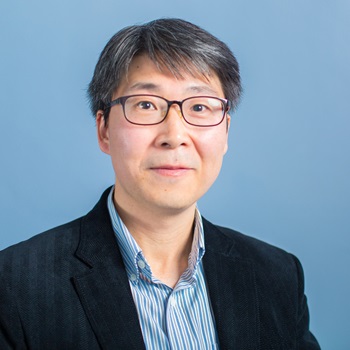 Gyu Myoung Lee Gyu Myoung Lee
LJMU, UK/KAIST, Korea (Chair, ITU-T Focus Group on Data Processing and Management for IoT and Smart Cities & Communities)
Gyu Myoung Lee is with the Liverpool John Moores University (LJMU), UK, as a Reader from 2014 and with KAIST Institute for IT convergence, Korea, as an Adjunct Professor from 2012. Prior to joining the LJMU, he has worked with the Institut Mines-Telecom, Telecom SudParis, France, from 2008. Until 2012, he had been invited to work with the Electronics and Telecommunications Research Institute (ETRI), Korea. He also worked as a research professor in KAIST, Korea and as a guest researcher in National Institute of Standards and Technology (NIST), USA, in 2007.
His research interests include Internet of things, computational trust, knowledge centric networking and services, multimedia services, and energy saving technologies including smart grids. He has been actively working for standardization in ITU-T, IETF and oneM2M, etc., and currently serves as a WP chair in SG13, a Rapporteur of Q16/13 and Q4/20 as well as an the chair of ITU-T Focus Group on data processing and management (FG-DPM) to support IoT and smart cities & communities. He is a Senior Member of IEEE.
He received his BS degree from Hong Ik University, Seoul, Korea, in 1999 and his MS and PhD degrees from the Korea Advanced Institute of Science and Technology (KAIST), Daejeon, Korea, in 2000 and 2007. |
 Richard Li Richard Li
FG NET-2030 Chairman and Chief Scientist, Huawei, United States Dr. Richard Li is Chief Scientist of Future Networks at Huawei USA, where he leads a senior research team to design and develop next-generation network architectures, technologies, protocols, and solutions. Before establishing the Future Networks Lab, Richard was Vice-President and Head of the Internet Technology Lab, Huawei USA, where he spearheaded network technology innovation and development encompassing several areas of networking such as Routing and MPLS, Cloud and Virtualization, SDN, and Orchestration. Prior to joining Huawei, he worked with Cisco and Ericsson in his various capacities, being a major contributor to their networking technologies, standards, solutions and operating systems. Richard serves as the Chairman of ITU-T FG Network 2030, the Vice Chairman of ETSI ISG Next-Generation Protocols, Co-Chairs of the Technical Program Committees for some international conferences and workshops. Richard is extremely passionate about advances in data communications, and challenges himself by solving problems in their entirety thus creating a bigger and long-term impact on future networks. |
|---|